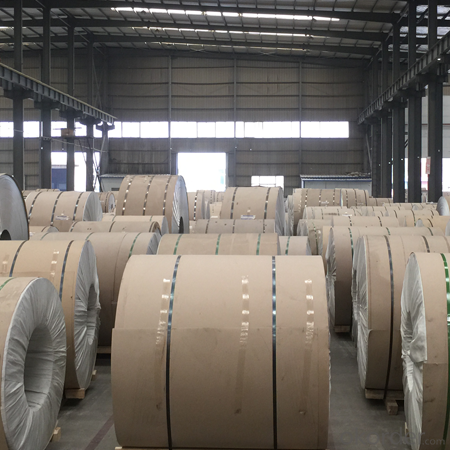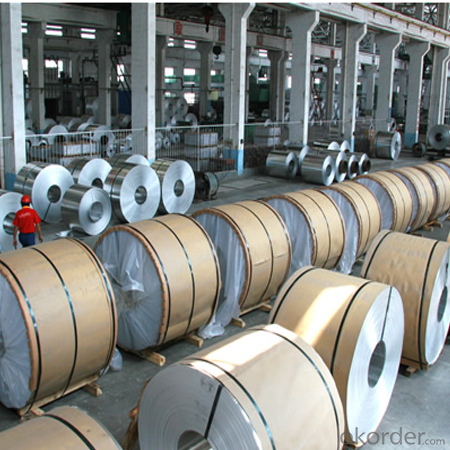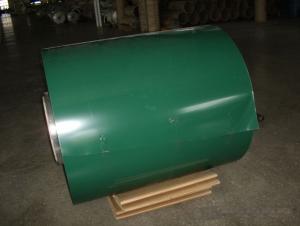Coated Aluminium Coil/Roll For Aluminium Roofing Panel
- Loading Port:
- Shanghai
- Payment Terms:
- TT OR LC
- Min Order Qty:
- 2 m.t.
- Supply Capability:
- 50000 m.t./month
OKorder Service Pledge
OKorder Financial Service
You Might Also Like
Item specifice
Coated Aluminium Coil/Roll For Aluminium Roofing Panel
Description
Alloy | 1060, 1100, 3003, 8011, etc. |
Temper | H16, H18, H24, H26, H28 |
Thickness | From 0.05mm to 3.0mm |
Width | Standard width:1240mm |
Special width:1300mm, 1520mm, 1570mm, 1595mm | |
Diameter | Standard dia:1200mm |
Interior dia:150mm,405mm,505mm | |
Weight | 2.5 T/coil,3.0 T/coil |
Coating | PE, PVDF, ACRYLIC |
Surface | Embossed, mill finish, coated |
Color | AS to code RAL |
Gloss | 10-90%(EN ISO-2813:1994) |
Coating Thickness | PE: more than 18 micron |
PVDF: more than 25 micron | |
Coating Hardness(pencil resistance) | More than 2h |
Coating adhesion | 5J (EN ISO-2409:1994) |
Impact Resistance | No peeling or cracking(50 kg/cm,ASTMD-2794:1993) |
Flexibility(T-bend) | 2T |
MEK resistance | More than 100 |
Advantage | 1.High temperature resistant 2.Weathering resistant 3.Scrubbing resistant 5.Acid or alkali proof 6. Fireproof 7.Light weight material is easy to construct and install |
Out package | Wooden splint with export standard |
Application | ACP, wall cladding, facades, roofs and canopies, ceilings, signboards, blind window, display platforms, electrical panels, etc |


Manufacturing
Decoiler → Accumulator →Tension Leveler →Acid & Alkali Cleaner → Rinse →Conversion Treatment → Priming coater →Infrared Curing Oven →Main coater →Floatation Curing Oven →Strippable Film Applicator → Exit Accumulator → Recoiler
FAQ
--Q: Do you provide free samples?
--A: Yes, free samples will be sent to you on freight at destination.
--Q: Can I get your latest products catalogue?
--A: Yes, it will be sent to you in no time.
--Q: What is the MOQ?
--A: 2 tons
--Q: What are your payment terms?
--A: We accept L/C, T/T.
--Q: What kinds of alloy can you supply?
--A: 1000 series: 1050, 1060, 1070, 1100, 1145, 1200
3000 series: 3003, 3004, 3105, 3104
5000 series: 5052, 5083, 5754, 5182
6000 series: 6061, 6063, 6062, 6063
8000 series: 8011, 8021
--Q: What kinds of temper can you supply?
--A: O-H112: O,H12,H14,H16,H18,H22,H24,H26,H,32,H34,H111,H112
T3, T4, T6
- Q:my text says aluminium does not corrode much as a passive aluminium oxide layer is formed on it.Well other metals such as sodium adn potassium also form oxides. Why dont their oxides prevent further oxidation ?
- sodium oxide and potassium oxide are water soluble aluminium oxide is not water soluble. the layer formed of oxide on the aluminium surface is coherent and adherent with no pores and stuck to the metal surface. the layer is also passive to most acids and alkalies except HCl and anti passive ions if present. sodium oxide and potassium oxide dissolve in any aqueous medium forming the corresponding alkalies NaOH and KOH leaving the fresh metal surface exposed to more corrosion. also the reaction of Na and K with aqueous media like water and acids is quite vigorous and fast unlike aluminium which is mu less reactive
- Q:And what are the advantages/disadvantages of steel aluminum in building cars?Which would be better for building cars?
- Steel and aluminum are both pretty strong, but aluminum is lighter. This gives a better strength/weight ratio. Aluminum is not as easy to weld as steel so this is a disadvantage but it is easier to sheet-form and do simple machining on. Aluminum would be better than steel for cars as it is strong enough while being much lighter - ending up in a faster, but equally dangerous hot rod.
- Q:What are the different alloy grades used in aluminum coils?
- There are several different alloy grades used in aluminum coils, each with their own unique properties and applications. Some of the most commonly used alloy grades include: 1. 1100: This is a commercially pure aluminum grade, known for its excellent corrosion resistance and high thermal conductivity. It is often used in applications that require good formability, such as fin stock, heat exchangers, and chemical equipment. 2. 3003: This alloy grade is known for its moderate strength and good workability. It is commonly used in applications that require both corrosion resistance and formability, such as packaging, cooking utensils, and general sheet metal work. 3. 5052: This alloy grade offers a good combination of strength, formability, and corrosion resistance. It is often used in marine environments, as well as in transportation equipment, such as fuel tanks and vehicle bodies. 4. 6061: This is a heat-treatable alloy grade, known for its excellent strength and weldability. It is commonly used in structural applications, such as bridges, aircraft parts, and bicycle frames. 5. 7075: This is another heat-treatable alloy grade, known for its high strength-to-weight ratio. It is often used in aerospace applications, as well as in the manufacturing of high-stress components, such as firearm parts and rock climbing equipment. These are just a few examples of the different alloy grades used in aluminum coils. The selection of the appropriate grade depends on the specific requirements of the application, such as desired strength, corrosion resistance, formability, and thermal conductivity.
- Q:Can aluminum coils be used for electrical applications?
- Aluminum coils can indeed be utilized for electrical purposes. The electrical industry extensively employs aluminum due to its superb conductivity, lightweight nature, and resistance to corrosion. Various electrical applications, such as transformers, motors, generators, and inductors and solenoids, commonly employ aluminum coils. These coils possess advantages like high thermal conductivity and minimal eddy current losses, which make them highly efficient in the transmission and distribution of electrical power. Moreover, aluminum coils are more cost-effective when compared to copper coils, making them the preferred choice for numerous electrical applications. Nevertheless, it is worth noting that aluminum possesses lower electrical conductivity than copper. Therefore, adjustments in the coil design and dimensions may be necessary to ensure optimal performance.
- Q:How do aluminum coils contribute to thermal management?
- Aluminum coils play a crucial role in thermal management due to their excellent heat transfer capabilities. Aluminum has a high thermal conductivity, which means it can efficiently transfer heat from one area to another. This property is essential in various applications that require effective thermal management, such as air conditioning systems, refrigeration units, and heat exchangers. In air conditioning systems, aluminum coils are commonly used in the condenser and evaporator coils. The condenser coil dissipates heat from the refrigerant to the surrounding air, while the evaporator coil absorbs heat from the indoor air to cool it down. The high thermal conductivity of aluminum allows for efficient heat transfer between the refrigerant and the surrounding air, resulting in faster and more effective cooling. Similarly, in refrigeration units, aluminum coils are utilized in the evaporator coils to remove heat from the interior space. The aluminum coils help to extract heat from the refrigerated area and transfer it to the outside environment, maintaining a lower temperature inside the unit. Aluminum coils also find application in heat exchangers, which are used in a wide range of industries, including automotive, power generation, and HVAC. Heat exchangers are devices that transfer heat between two or more fluids, often with different temperatures. The high thermal conductivity of aluminum enables efficient heat exchange between the fluids, improving overall system performance and energy efficiency. Moreover, aluminum coils are lightweight and resistant to corrosion, making them highly durable and suitable for long-term use in harsh environments. These properties further enhance their contribution to thermal management by ensuring reliable heat transfer and reducing the risk of system failure or efficiency loss. In summary, aluminum coils are instrumental in thermal management systems as they facilitate efficient heat transfer, contribute to faster cooling or heating processes, and enhance overall system performance. Their high thermal conductivity, lightweight nature, and corrosion resistance make them a preferred choice in various applications where effective thermal management is essential.
- Q:What are the common cutting and shaping methods for aluminum coils?
- The common cutting and shaping methods for aluminum coils include shearing, blanking, punching, and forming.
- Q:when ferrous sulfate is poured into an aluminium can, holes appear in the can. Why?
- aluminum reacts via a redox reaction with iron(II): 3 Fe2+(aq) + 2 Al(s) --- 3 Fe(s) + 2 Al3+(aq)
- Q:Can aluminum coils be used in the manufacturing of lighting fixtures?
- Yes, aluminum coils can be used in the manufacturing of lighting fixtures. Aluminum is a versatile and lightweight material that has excellent thermal conductivity properties, making it suitable for dissipating heat generated by the light source. Additionally, aluminum coils are easily moldable, allowing for the creation of intricate designs and shapes in lighting fixtures. The corrosion-resistant nature of aluminum also ensures the longevity and durability of the lighting fixture. Overall, aluminum coils are a popular choice in the manufacturing of lighting fixtures due to their numerous advantages.
- Q:What are the different color options for pre-painted aluminum coils?
- The different color options for pre-painted aluminum coils are extensive and can include a wide range of shades such as white, black, gray, blue, red, green, yellow, and many more. The options are virtually limitless, allowing for customization and versatility in various applications.
- Q:What is the maximum width of aluminum coils?
- The maximum width of aluminum coils can vary depending on the specific manufacturer and application, but it typically ranges from 60 inches to 96 inches.
1. Manufacturer Overview |
|
|---|---|
| Location | |
| Year Established | |
| Annual Output Value | |
| Main Markets | |
| Company Certifications | |
2. Manufacturer Certificates |
|
|---|---|
| a) Certification Name | |
| Range | |
| Reference | |
| Validity Period | |
3. Manufacturer Capability |
|
|---|---|
| a)Trade Capacity | |
| Nearest Port | |
| Export Percentage | |
| No.of Employees in Trade Department | |
| Language Spoken: | |
| b)Factory Information | |
| Factory Size: | |
| No. of Production Lines | |
| Contract Manufacturing | |
| Product Price Range | |
Send your message to us
Coated Aluminium Coil/Roll For Aluminium Roofing Panel
- Loading Port:
- Shanghai
- Payment Terms:
- TT OR LC
- Min Order Qty:
- 2 m.t.
- Supply Capability:
- 50000 m.t./month
OKorder Service Pledge
OKorder Financial Service
Similar products
New products
Hot products
Related keywords





























